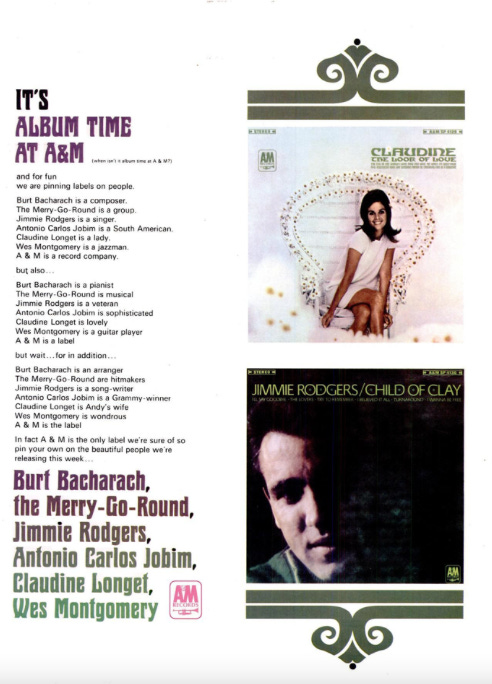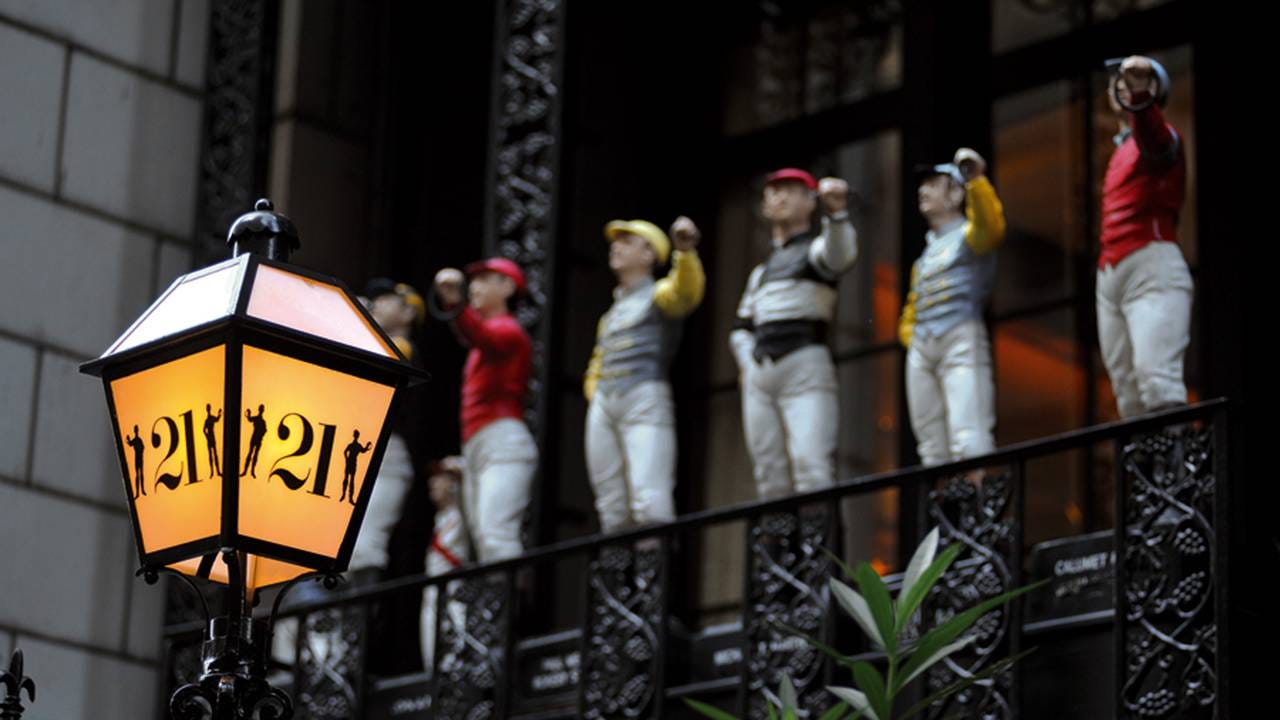Burt Offerings
I say a little prayer of thanks for some choice Bacharach bits
Last week’s announcement that Burt Bacharach had passed filled me more with wonder and gratitude than sadness. On the one hand, the combined recent deaths of both Burt and Thom Bell do feel like the final slam of a mighty iron door on a magical era of songcraft and record production; on the other hand, I can’t help but think about how lucky were we to exist at time when giants like these walked the earth, filling our lives with their music.
My first reaction upon learning of Burt’s death was to pen this piece for the Forward celebrating Reach Out, my favorite Bacharach solo LP — and really, one of my favorite albums by anyone, ever. It’s been incredibly gratifying to learn since then how many other folks deeply love that record, as well. For all y’all, here’s the two-page spread that A&M records took out in the September 16, 1967 issue of Billboard, announcing the release of Reach Out along with five other new albums. Of the six, only The Merry-Go-Round’s debut LP was released with an eye on the “youth market”; everything else was firmly in the adult bag.
Which, since I first became aware of Burt Bacharach, was the bag I always put him in, as well. Sure, he wrote a few hits geared for maximum teen appeal (like The Five Blobs’ “The Blob,” or “Baby It’s You” as waxed by the Shirelles/Beatles/Smith), but these were outliers; just about everything else bearing his complex chords and indelible melodies seemed to come from a world more adult and much classier than my own.
Of course, if I am to be completely honest here, my initial awareness (and idolization) of Burt Bacharach occurred not as the result of his music, but via the late-’70s TV ads that he and then-wife Angie Dickinson filmed for Martini & Rossi, which leaned heavily on the same “classy adult” vibe I’ve long associated with his tunes…
Looking back at these spots now, I can totally see why they resonated so deeply with 12-year-old me. Not only did Burt n’ Angie’s existence appear to be so much more orderly and elegant than my own, but here was a Jewish dude whose suave bearing and handsome visage offered a welcome (to me, at least) departure from the funny-but-gnomish lane that so many Jewish entertainers seemed to occupy in those days. I mean, here’s none other than Police Woman’s Pepper Anderson, staring hungrily at Burt like she’s about to bust out the handcuffs and book him for unlawful hotness. Mrs. Kotter never looked at Mr. Kotter like that…
By the way, there’s a great story in The Captain & Me: On and Off the Field with Thurman Munson, my book with Ron Blomberg, about the time Thurman and Ron were dining with Soupy Sales at NYC’s famous 21 Club and ran into Burt n’ Angie. I won’t offer any spoilers, but Thurman and Burt definitely hit it off…
I tend to think of Paul Newman and longtime Bacharach associate Herb Alpert as being cut from similar cloth as Burt; they were all classically handsome Jewish dudes who were deadly serious about their craft, but who also possessed a low-key playfulness and modest self-deprecation that came through beautifully in both their work and their interviews. And for what it’s worth, all three were real mensches who directed a lot of money and muscle towards good causes throughout their lives. A young man of Jewish heritage looking for male celebrity role models could have certainly done much worse…
As with Alpert’s recordings with the Tijuana Brass and beyond, Bacharach’s work was too often consigned the “elevator music” bin. While I genuinely love elevator music, and will happily admit that Bacharach’s melodies have a way of fitting nicely inside the soft and comfortably rounded corners of the genre, I stopped seeing his music as elevator-y around the first time I heard Elvis Costello singing Bacharach and Hal David’s “I Just Don’t Know What to Do With Myself” on the Live Stiffs LP. There was certainly nothing remotely “schmaltzy” or ironic about the Costello version, as far as I could tell; and if someone as fiercely intelligent as Elvis found genuine value in Bacharach’s work, I figured that it probably warranted further investigation…
It was around this same time that my friend and future bandmate Jason (he who would later hip me to the brilliance of 3+3 by The Isley Brothers) called my attention to the brilliance of “I Say a Little Prayer”. We were killing time between classes at the Jewel across the street from our high school, finding amusement in parsing the apparent differences between head cheese and sagey souse, when Dionne Warwick’s version came on over the PA system — as it will surely continue to do at supermarkets until the end of time. Jason, whose older brother is a jazz drummer, pointed out the weird time signatures in the song (especially that 11/4 chorus), and told me that Burt Bacharach and Hal David liked to work with Dionne because she was the only singer who could consistently handle those kinds of changes.
Obviously, quite a few other artists have offered up their own brilliant interpretations of Bacharach-David compositions over the years — Dusty Springfield’s version of “The Look of Love” from the Casino Royale soundtrack being arguably the finest of them all — but Jason’s lunchmeat aisle revelation really gave me a new perspective on Bacharach’s music. How could a song that sounded so effortlessly catchy also be so complex when you looked under the hood?
The deeper I got into Bacharach’s music, the more I realized that said complexity wasn’t limited to his chords and time signatures. There was an emotional complexity to it as well, which David brilliantly tapped into time and time again with his lyrics, most of which expressed very adult emotions and concerns. “I Say a Little Prayer,” for example, was written from the perspective of a woman whose man was serving in the Vietnam War; though its spritely melody and obsessive lyrics could cause the casual listener to mistake it for a song about an unrequited schoolgirl crush, “Prayer”’s ‘Nam connection makes perfect sense once you know about it — and the multilayered emotions in Bacharach’s music really allow the song to work on both of those levels.
Though it wasn’t based on anything as traumatic as a loved one going off to war, “Reach Out For Me” — originally recorded in 1963 by Lou Johnson, and then by Dionne Warwick the following year — packs even more of a powerful wallop for me. It is a grown-ass adult love song, a meditation on the profound importance of love (in whatever form that may take), connection and support in getting through the alienating and soul-crushing obstacle course of daily existence. And it reduces me to tears just about every time.
Another of my favorite (if somewhat lesser-known) Bacharach-David compositions is 1973’s “Something Big”. Once again, the magic really lies in the layers and juxtapositions — a lilting melody and a cocktail-friendly groove set against bittersweet chords that mesh perfectly with David’s hopeful-yet-melancholy lyrics about the endless struggle between ambition and self-doubt. I can certainly relate; you probably can, too…
Thanks for the incredible music, Burt. You were definitely “something big” for a whole bunch of us. May you rest in classy peace.
Oh, and speaking of great Jewish songwriters with a melancholy streak… “Solitary Man” — my favorite Neil Diamond song — is the focus of the latest video from The Darkness frontman Justin Hawkins. I’ve long been a massive fan of Hawkins and his band; his “Justin Hawkins Rides Again” series of videos is always incredibly funny and informative, and I’m delighted to learn that he’s such a huge Neil fan. But I’m even more delighted that he not only namechecks me in this video and quotes from a 2005 Rolling Stone piece I wrote on the song, but that he also seems to genuinely appreciate “the Epstein analysis,” as he puts it. Thank you, Justin — you totally made my week!






Same. That one album is great but that’s all I have of hers tbh. But man did they get it right. Thanks again!
I don’t know where else to ask this Dan...have you ever written about Laura Nyro? Her motown soul album with LaBelle is absolute perfection to me, and I seem to remember reading she came from the same songwriting group as Bacharach did. (Gonna Take a Miracle is the album.) It’s an era I love but don’t know anything about.